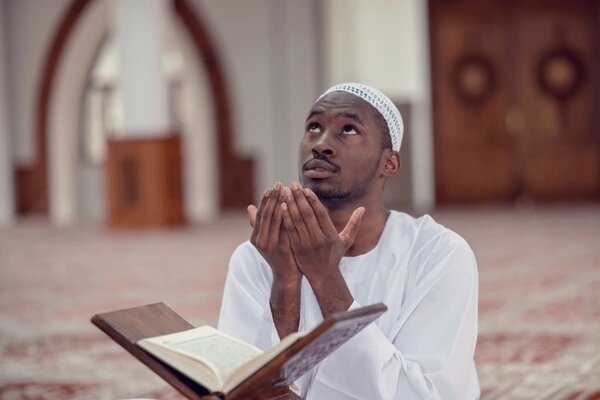Fasting for Muslims Officially Begins in Kenya

Chief Kadhi Athman Abdulhalim Hussein of Kenya has officially declared that the holy month of Ramadan will begin on Tuesday, March 12th, 2024.
The Chief Kadhi made the declaration following the sighting of the crescent moon in several counties.
Athman said the crescent was sighted in parts including Mombasa and Lamu, Malindi in Kilifi, Tana River, and Mandera.
However, the overwhelming majority of Muslims in Kenya began fasting on Monday, following the sighting of the new moon in several Middle Eastern countries, including Saudi Arabia, Qatar, and the United Arab Emirates.
This discrepancy isn’t unusual and echoes similar instances during Eid celebrations, where the chief kadhi’s calls for celebrations a day later.
On Sunday, Imam Jamaludin Osman of Jamia Mosque and other Ulamas announced the commencement of Ramadan on Monday, a sentiment that resonated with many Muslims in the North Eastern, coastal counties, and Eastleigh in Nairobi, who began fasting accordingly.
Following his announcement, Athman has been criticised, with some social media users accusing him of misleading the Muslim community in Kenya.
Despite the differing opinions, the impact of the first day of Ramadan was felt across the country.
Fasting during Ramadhan is one of the five pillars of Islam, along with the Muslim declaration of faith, five daily prayers, giving Zakah (charity), and performing the Hajj pilgrimage to Mecca, Saudi Arabia.
The start of Ramadhan, the ninth and holiest month in the Islamic calendar, is determined by the sighting of a new moon, and in the Muslim world, all eyes will be set on the heavens on Saturday and Sunday to see the Ramadhan moon.
Islam adheres to the lunar calendar which means that the month of Ramadhan begins or ends when the first crescent of a new moon is sighted.
The exact dates of Islamic occasions can’t be set in advance due to the nature of the Islamic lunar calendar as opposed to the Gregorian one that uses the solar calendar.
The lunar calendar, which is followed by Islam, is 10 to 11 days shorter than the modern 365-day Gregorian calendar, which is based on the Earth’s rotation around the sun, The difference means that Ramadhan begins and ends on a different date each year.
The commencement of Ramadhan, the month of worship, sacrifice, and charity begins next week as soon as the new crescent moon is sighted.
Ramadhan is the most sacred period of the year for Muslims who have to abstain from all forms of food and drinks during the daylight hours, breaking their fast at sunset.
Fasting is compulsory for every Muslim male or female but exemptions include children under the age of puberty, insane people, men, and women who are too old to undertake the obligation of fasting.
Others include sick people whose health is likely to be severely affected by the observance of fast, pregnant women and women breast-feeding their children and women in the period of menstruation.
It’s the season when Muslims around the globe focus on prayer, fasting, giving charity, and religious devotion.
Muslims are highly encouraged to pray more during this month and there are extra prayers at night “Taraweeh”, which are mostly performed in the mosques as congregational prayers.
In Mombasa mosques across town have started special sessions and classes (Darsa) to usher in the holy month of fasting.
Mosques have started publishing and distributing Ramadhan timetables containing the dates of the beginning and end of the holy month to the faithful.
Local mosques also provide iftar dinners (food for breaking fast), coffee, and dates for the needy faithful to break their fast-during sunset.
The Chief Kadhi Sheikh Abdulhalim Hussein Athman has called on Muslims in Kenya to keenly watch out for the crescent moon on the evening of Saturday and Sunday.
He asked Muslims to avoid the controversy that usually surrounds the sighting of the crescent moon marking the beginning of the fast by respecting the directions offered by the office of Chief Kadhi on the matter.
The religious scholar said Muslims in Kenya will commence observing the fast once the new crescent moon is sighted in the East African region.
Sheikh Athman says abstaining from food and drink during daylight hours allows Muslims to practice willpower and focus their energy on working on their faith.
He said an initiative to end the incessant differences witnessed during Ramadhan moon sighting has been launched and called for cooperation and unity among the faithful.
The senior judicial officer says a moon sighting committee with representation from across the country is in place and will give directions.
He says his office has formed a dedicated committee that checks and officially announces the start and end date of the fasting month of Ramadhan.
The moon sighting is usually done with telescopes or gazing at the skies with the naked eye before it is announced.
He urged the Muslim community in the country to be peaceful, united, and live harmoniously with Kenyans of different religious affiliations.
Sheikh Athman said the month commemorates the first revelation of the holy Quran (Koran) to Prophet Muhammad according to the Islamic faith.
The cleric said during the blessed month, Muslims observe a strict fast between dawn and dusk and participate in pious activities such as Koran recitations, prayers, and charitable giving.
Sheikh Athman urged the well-endowed members of the society to use the fasting period to assist the less fortunate members of the society by giving out alms and foodstuffs to poor households.
He noted that Ramadhan is about more than just giving up food and water but focuses on spiritual discipline.
The religious leader-cum-judicial officer said Ramadhan is a time for renewing faith and purifying the ‘heart and soul’ of the millions who share in the Muslim faith around the world.
“Muslims should look out for the crescent moon this weekend,” said Sheikh Aboud Mohamed of Jundan mosque.
Sheikh Mohamed said the fast is intended to bring the faithful closer to Allah and to remind them of the sufferings of the less fortunate members of society.
He says fasting allows Muslims to empathize with those who are less fortunate and be more compassionate to those in need of help.
The cleric says eating or drinking intentionally invalidates one’s fast, as the purpose of Ramadhan is to practice self-restraint and engage in religious acts; however, eating or drinking, if it is done through a genuine mistake, does not nullify the fast and faithful can continue fasting as normal.
“Ramadhan is almost upon us and we should be preparing to mark the holy month with fasting and intense prayers,” he said in his weekly Friday sermon.
The cleric said during the blessed month, Muslims observe a strict fast between dawn and dusk and participate in pious activities such as Koran recitations, prayers, and charitable giving.
“Ramadhan is a month of mercy and bonding and spreading happiness all around,” he said, adding that Muslims should pray for religious harmony, peace, prosperity, and tranquility in the country.
In Mombasa as elsewhere in the Muslim world during the entire period of fasting business premises, especially hotels, cafes, and juice parlors are shut during the day out of respect for the fasting month.






